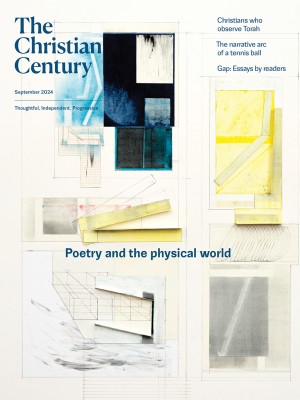A posture of hope
No, everything is not fine. But we can help each other envision a better way.

(Illustration: master1305 / iStock / Getty)
Most of us have participated in conversations in which someone mentions a discouraging political trend or societal crisis of the day. That’s usually when other participants weigh in with their own take on present gloom. From there the shape of the conversation deteriorates rapidly. Good cheer gets replaced by a cloud of pessimism. Only a shift to idle chatter about the weather tends to rescue the moment. Despair is easy to come by in anxious and divided times.
But there is another way. We can choose to live with a posture of hope instead of a disposition of dread. In fact, when you open any issue of this magazine, I want you to see our commitment to hope. That’s both our legacy at the Century and how we wish to be known. To be for good and important things in life is more noble than merely being against disturbing events and trends.
Read our latest issue or browse back issues.
One of the greatest gifts God hands to each of us is our ability to choose. Through our choices we become certain kinds of people or, in the case of journalistic decision making, a certain sort of magazine. Attitudinal choices and adjustments in outlook—when we are able to make them—reveal what kind of people we get to become. David Sipress captures this truth in his New Yorker cartoon featuring a couple walking the beach at sunset. They’ve obviously been arguing. “All right, Stephanie,” the man says exasperatedly. “You win. It’s great to be alive!”
Yes, it is great to be alive. Negative energy has never taken anyone anywhere significant, so far as I can tell. Complaining about life rarely brings satisfying results. And cynicism about the world around us is just a way of keeping distance and exempting oneself from responsibility or involvement. As poet Christian Wiman once put it, “Cynicism is nothing but a retreat into your own little refuge where you can point and make judgments, all the while feeling a sense of superiority.”
In a long section of Luke’s Gospel, Jesus speaks of the fear and anxiety that will infiltrate people’s lives as they witness distress, persecution, calamity, and more. The cataclysmic events enveloping the earth will be matched only by the chaos rumbling around in people’s souls. But then, in a most improbable image, Jesus starts talking about spring. He paints a parable of green leaves appearing on bare trees. Suggesting that summer and the kingdom of God are near, he calls his followers to stand tall amidst the turmoil as he summons them to live expectantly in hope (Luke 21:5–36).
“In [Jesus Christ] every one of God’s promises is a ‘Yes,’” writes the apostle Paul in response to critics who questioned his integrity after he altered his travel plans (2 Cor. 1:20). Bothered that others would consider him unreliable, he makes clear that he’s enthused to live his life with a hope-filled outlook, precisely because he trusts in the yes of Jesus Christ. As the late Peter Gomes said of the gospel, “There are only two reactions [to it]. . . . It is either ‘yes’ or ‘no.’ . . . Either you accept that belief in Jesus means a change in you and in your worldview or you do not.”
Yes might be the most powerful word in the world. It can create, build, and heal. Its capacity to change hearts makes it essential to a posture of hope. And hope is not some silly conviction that everything in society and politics is just fine. It isn’t fine. Hope merely visualizes a better way—a way to walk into the future and, even more importantly, create a future. We at the Century are here to do that with you. Thanks for your support, which only furthers our hope-filled take on life.






